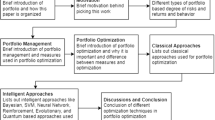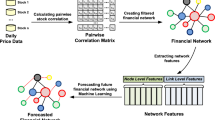Abstract
In this paper, we try to apply the advantages of principal component analysis (PCA) and online learning to the calculation of optimal portfolio investments. Each of these methods is widely used separately. This is done in order to make it possible to use online learning algorithms for high-dimension portfolios.


Similar content being viewed by others
Data availability
This manuscript has no associated data.
References
Markowitz H. Portfolio selection. J. financ. v. 7. n. 1. p.77-91. 1952.
Brandt M. Portfolio choice problems. Handbook financ. economet. n. 1. p. 269-336. 2009.
Steinbach M.C. Markowitz revisited: mean-variance models in financial portfolio analysis. SIAM rev. v. 43. n. 1. p. 31-85. 2001.
Konno H., Yamazak H. Mean-absolute deviation portfolio optimization model and its applications to Tokyo stock market. Manag. sci. v. 37. n.5. p. 519-531. 1991.
Basak S., Shapiro A. Value-at-risk-based risk management: optimal policies and asset prices. Rev. financ. stud. v. 14. n. 2. p. 371-405. 2001.
Rochafellar R., Uryasev S. Optimization of conditional value-at-risk. J. risk. n. 2. p. 21-42. 2000.
Fabozzi F., Huang D., Zhou G. Robust portfolios: contributions from operations research and finance. Ann. oper. res. v. 176. n. 1. p. 191-220. 2010.
Schlesinger M., Glavach V. Ten lectures on structural and statistical pattern recognition. Naukova dumka. 546 p. 2004.
Pflug G., Pohl M. A review on ambiguity in stochastic portfolio optimization. Set-valued var. anal. n. 26. p. 733-757. 2018.
Wozabal D. A framework for optimization under ambiguity. Ann. oper. res. v. 193. n. 1. p. 21-47. 2002.
Pflug G., Wozabal D. Ambiguity in portfolio selection. Quant. finan. v. 7. n. 4. p. 435-442. 2007.
Beliavsky G., Danilova N., Logunov A. Unsupervised learning and robust optimization in the portfolio problem. Bulletin of higher educational institutes. North-Caucasus region. Natural sciences. n. 4. p. 4-9. 2020.
Rokach L., Oded M. Clustering methods. Data mining and knowledge discovery handbook. Springer US. p. 321-352. 2005.
Ben-Tal, Chaoui, Nemirovski. Robust optimization. Princeton university press. p. 542. 2009.
Bandi, Bertsimas. Robust option pricing. European journal of operational research. v. 239. p. 842-853. 2014.
Danilova N., Yao K. The Minimal Ellipsoid and Robust Methods in the Optimal Portfolio Problem. Engineering Letters. v. 30. n. 4. p. 1465-1469. 2022.
Boudt K., Rousseeuv P., Vanduffel S., Verdonck T. The minimum regularized covariance determinant estimator. Statistics and computing. v. 30. p. 113-128. 2019.
Rousseeuv P., van Driessen K. A fast algorithm for the minimum covariance determinant estimator. Technometrics. v. 41. p. 212-223. 1999.
Boyd S., Vanderberghe L. Convex optimization. Cambridge university press. 716 p. 2009.
Hampel F. A general quantitative definition of robustness. Ann. of mathematical statistics. v. 42. p. 1887-1996. 1971.
Rousseeuv P., Grossman W., Pflug G., Vincze I., Wertz W. Multivariate estimation with high breakdown point. Mathematical statistics and applications. p. 283-297. 1985.
Tichonov A., Arsenin V. Methods for solving ill-posed problems. M.: Nauka. 430 p. 1974.
Pflug G., Pohl M. A review on ambiguity in stochastic portfolio optimization. Set-valued and variational analysis. v. 26. p. 733-757. 2018.
Blanchety G., Chenz L., Zhoux X. Distributionally robust mean-variance portfolio selection with Wasserstein distances. Management science. 2021.
Pearson K. On line and planes of closet fit to systems of points in space. Philosophical magazine. v. 2. p. 559-572. 1901.
Egloff M., Leippold M., Wu L. The term structure of variance swap rates and optimal variance swap investments. Journal of financial and quantitative analysis. v. 45. p. 1279-1310. 2010.
Ding Y., Yingying L., Xinghua Z. High dimensional minimum variance portfolio estimation under statistical factor models. Journal of econometrics v. 222. p. 502-515. 2021.
Kreinin A., Merkoulovitch L., Rosen D., Zerbs M. Principal component analysis in quasi Monte-Carlo simulation. Algo research quarterly. v.1. n.2. p. 21-29. 1988.
Peng Y., Albuquerque P., Nascimento I. Machado J. Between nonlinearities, complexity: an application on portfolio selection using kernel principal component analysis. Entropy. v. 21. n. 376. p. 2-27. 2019.
Brillinger D. Time series: Data analysis and theory. Classic and applied mathematics. SIAM. 2001.
Ait-Sahalla Y., Xiu D. Principal component analysis of high-frequency data. Journal of the american statistical association. v. 114. n. 525. p. 287-303. 2019.
Cover T. Universal portfolios. Math. financ. v. 1. p. 1-19. 1991.
Helmbold D. Online portfolio selection using multiplicative updates. Mathematical finance. v. 8. n. 4. p. 325-347. 1998.
Agarwal A. Algorithms for portfolio management based on the Newton method. Proceedings of the 23rd international conference on machine learning. p. 9-16.
Luo H., Wei C., Zheng K. Efficient online portfolio with logarithmic regret. Proceedings of the 32nd international conference on neural information processing systems. p. 8245-8255.
Van Erven T. Open problem: fast and optimal online portfolio selection. Conference on learning theory. p. 3864-3869. 2020.
Shalev-Shwartz S. Online learning and online convex optimization. Found. trends mach. learn. v. 4. p. 107-94. 2012.
Hazan E. Introduction to online convex optimization. Found. trends optim. v. 2. p. 157-325. 2016.
McMahan HB. A survey of algorithms and analysis for adaptive online learning. J. mach. learn. res. v. 18. p. 1-50. 2018.
Orabona F. A modern introduction to online learning. arXiv:1912.13213 [cs.LG]. 2019.
Bau D., Trefethen, L. Numerical linear algebra. Philadelphia: society for industrial and applied mathematics. (Lecture 31). 1997.
Funding
This research received no external funding.
Author information
Authors and Affiliations
Corresponding author
Ethics declarations
Ethical approval
Not applicable.
Competing interests
The authors have no relevant financial or non-financial interests to disclose.
Rights and permissions
Springer Nature or its licensor (e.g. a society or other partner) holds exclusive rights to this article under a publishing agreement with the author(s) or other rightsholder(s); author self-archiving of the accepted manuscript version of this article is solely governed by the terms of such publishing agreement and applicable law.
About this article
Cite this article
Beliavsky, G., Danilova, N. & Yao, K. PRINCIPAL COMPONENT ANALYSIS AND OPTIMAL PORTFOLIO. J Math Sci 271, 368–377 (2023). https://doi.org/10.1007/s10958-023-06526-7
Accepted:
Published:
Issue Date:
DOI: https://doi.org/10.1007/s10958-023-06526-7




